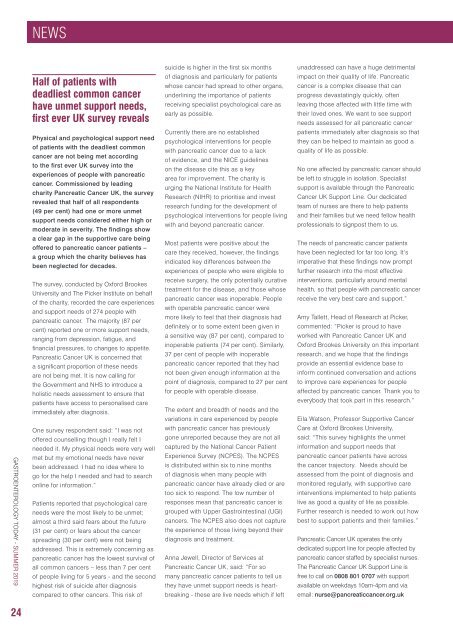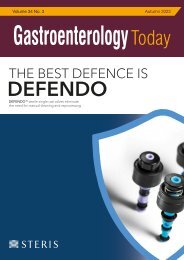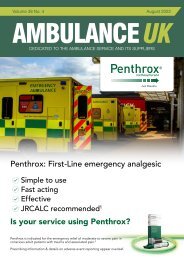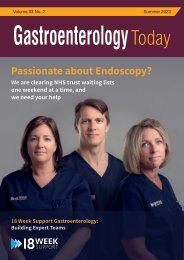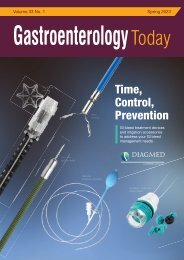You also want an ePaper? Increase the reach of your titles
YUMPU automatically turns print PDFs into web optimized ePapers that Google loves.
NEWS<br />
suicide is higher in the first six months<br />
unaddressed can have a huge detrimental<br />
Half of patients with<br />
deadliest common cancer<br />
have unmet support needs,<br />
first ever UK survey reveals<br />
of diagnosis and particularly for patients<br />
whose cancer had spread to other organs,<br />
underlining the importance of patients<br />
receiving specialist psychological care as<br />
early as possible.<br />
impact on their quality of life. Pancreatic<br />
cancer is a complex disease that can<br />
progress devastatingly quickly, often<br />
leaving those affected with little time with<br />
their loved ones. We want to see support<br />
needs assessed for all pancreatic cancer<br />
GASTROENTEROLOGY TODAY - SUMMER <strong>2019</strong><br />
Physical and psychological support need<br />
of patients with the deadliest common<br />
cancer are not being met according<br />
to the first ever UK survey into the<br />
experiences of people with pancreatic<br />
cancer. Commissioned by leading<br />
charity Pancreatic Cancer UK, the survey<br />
revealed that half of all respondents<br />
(49 per cent) had one or more unmet<br />
support needs considered either high or<br />
moderate in severity. The findings show<br />
a clear gap in the supportive care being<br />
offered to pancreatic cancer patients –<br />
a group which the charity believes has<br />
been neglected for decades.<br />
The survey, conducted by Oxford Brookes<br />
University and The Picker Institute on behalf<br />
of the charity, recorded the care experiences<br />
and support needs of 274 people with<br />
pancreatic cancer. The majority (87 per<br />
cent) reported one or more support needs,<br />
ranging from depression, fatigue, and<br />
financial pressures, to changes to appetite.<br />
Pancreatic Cancer UK is concerned that<br />
a significant proportion of these needs<br />
are not being met. It is now calling for<br />
the Government and NHS to introduce a<br />
holistic needs assessment to ensure that<br />
patients have access to personalised care<br />
immediately after diagnosis.<br />
One survey respondent said: “I was not<br />
offered counselling though I really felt I<br />
needed it. My physical needs were very well<br />
met but my emotional needs have never<br />
been addressed. I had no idea where to<br />
go for the help I needed and had to search<br />
online for information.”<br />
Patients reported that psychological care<br />
needs were the most likely to be unmet;<br />
almost a third said fears about the future<br />
(31 per cent) or fears about the cancer<br />
spreading (30 per cent) were not being<br />
addressed. This is extremely concerning as<br />
pancreatic cancer has the lowest survival of<br />
all common cancers – less than 7 per cent<br />
of people living for 5 years - and the second<br />
highest risk of suicide after diagnosis<br />
compared to other cancers. This risk of<br />
Currently there are no established<br />
psychological interventions for people<br />
with pancreatic cancer due to a lack<br />
of evidence, and the NICE guidelines<br />
on the disease cite this as a key<br />
area for improvement. The charity is<br />
urging the National Institute for Health<br />
Research (NIHR) to prioritise and invest<br />
research funding for the development of<br />
psychological interventions for people living<br />
with and beyond pancreatic cancer.<br />
Most patients were positive about the<br />
care they received, however, the findings<br />
indicated key differences between the<br />
experiences of people who were eligible to<br />
receive surgery, the only potentially curative<br />
treatment for the disease, and those whose<br />
pancreatic cancer was inoperable. People<br />
with operable pancreatic cancer were<br />
more likely to feel that their diagnosis had<br />
definitely or to some extent been given in<br />
a sensitive way (87 per cent), compared to<br />
inoperable patients (74 per cent). Similarly,<br />
37 per cent of people with inoperable<br />
pancreatic cancer reported that they had<br />
not been given enough information at the<br />
point of diagnosis, compared to 27 per cent<br />
for people with operable disease.<br />
The extent and breadth of needs and the<br />
variations in care experienced by people<br />
with pancreatic cancer has previously<br />
gone unreported because they are not all<br />
captured by the National Cancer Patient<br />
Experience Survey (NCPES). The NCPES<br />
is distributed within six to nine months<br />
of diagnosis when many people with<br />
pancreatic cancer have already died or are<br />
too sick to respond. The low number of<br />
responses mean that pancreatic cancer is<br />
grouped with Upper Gastrointestinal (UGI)<br />
cancers. The NCPES also does not capture<br />
the experience of those living beyond their<br />
diagnosis and treatment.<br />
Anna Jewell, Director of Services at<br />
Pancreatic Cancer UK, said: “For so<br />
many pancreatic cancer patients to tell us<br />
they have unmet support needs is heartbreaking<br />
- these are live needs which if left<br />
patients immediately after diagnosis so that<br />
they can be helped to maintain as good a<br />
quality of life as possible.<br />
No one affected by pancreatic cancer should<br />
be left to struggle in isolation. Specialist<br />
support is available through the Pancreatic<br />
Cancer UK Support Line. Our dedicated<br />
team of nurses are there to help patients<br />
and their families but we need fellow health<br />
professionals to signpost them to us.<br />
The needs of pancreatic cancer patients<br />
have been neglected for far too long. It’s<br />
imperative that these findings now prompt<br />
further research into the most effective<br />
interventions, particularly around mental<br />
health, so that people with pancreatic cancer<br />
receive the very best care and support.”<br />
Amy Tallett, Head of Research at Picker,<br />
commented: “Picker is proud to have<br />
worked with Pancreatic Cancer UK and<br />
Oxford Brookes University on this important<br />
research, and we hope that the findings<br />
provide an essential evidence base to<br />
inform continued conversation and actions<br />
to improve care experiences for people<br />
affected by pancreatic cancer. Thank you to<br />
everybody that took part in this research.”<br />
Eila Watson, Professor Supportive Cancer<br />
Care at Oxford Brookes University,<br />
said: “This survey highlights the unmet<br />
information and support needs that<br />
pancreatic cancer patients have across<br />
the cancer trajectory. Needs should be<br />
assessed from the point of diagnosis and<br />
monitored regularly, with supportive care<br />
interventions implemented to help patients<br />
live as good a quality of life as possible.<br />
Further research is needed to work out how<br />
best to support patients and their families.”<br />
Pancreatic Cancer UK operates the only<br />
dedicated support line for people affected by<br />
pancreatic cancer staffed by specialist nurses.<br />
The Pancreatic Cancer UK Support Line is<br />
free to call on 0808 801 0707 with support<br />
available on weekdays 10am-4pm and via<br />
email: nurse@pancreaticcancer.org.uk<br />
24


